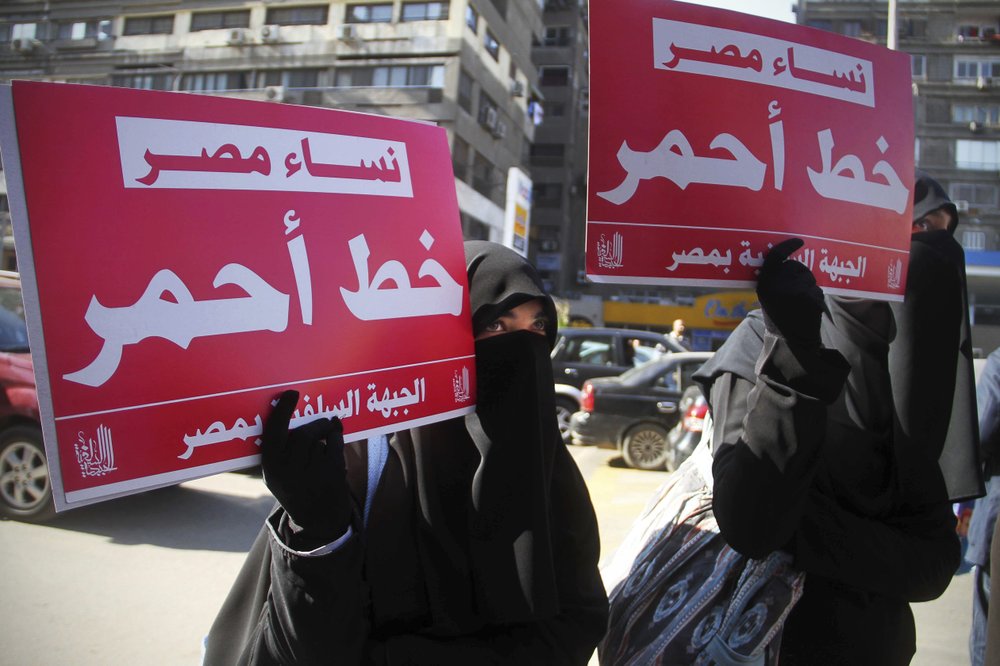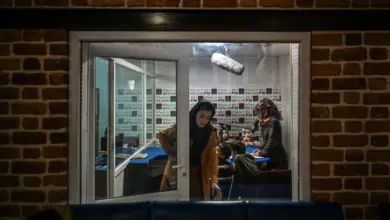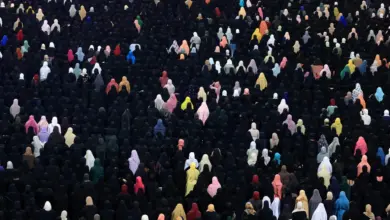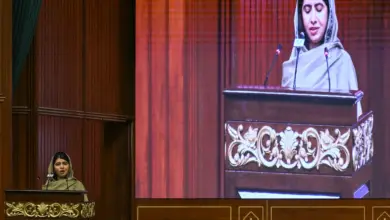On my way to the 8 March women’s march scheduled to take off from the Press Syndicate downtown, I overheard an animated conversation between two young men walking beside me near Ramses Street. One was almost shouting at the other, telling him, “Over my dead body would I take money from a woman; why would I do that?! Curse the day when that would happen; in fact, curse all the women in the world if that ever happens!” Coming from the opposite direction was an elderly lady dressed in the traditional black galabeya who stopped short in her tracks at hearing this curse. She chastised the young man for being so ungrateful and rude to the women who took care of him all his life at which point he sheepishly replied, “Not all harem are like you, my mother.” She looked him straight in the eye and shouted, “I’m not a horma, I’m a dakar,’” turned and walked on her way. Briefly, hareem, the plural of horma, means women, but it holds within it meanings of dependency, weakness and need for protection and concealment. Dakar, on the other hand, refers to a masculine man, strong and able, usually signifying superiority over the lesser horma, with other misogynist undercurrents included. The woman was not really his mother, saying “my mother” is a figure of speech to signify respect toward an older woman.
The story raises a few interesting points. First that women are aware that they are taking care of their families and spending on them precious time and money, as the elderly lady made clear to the young man. Almost a third of Egyptian households have women as their main breadwinner, and most of the remaining households can barely survive on the income of the two spouses combined. Secondly, despite this, there is still a psycho-social aversion to recognizing the active role of women in the survival of their families — indeed their communities and society — as dependency on women is often taken as a sign of the weakness of men. Third, when a woman needs to be recognized as a strong, independent and active person, she contests the horma (woman) identification and instead asserts that she is a dakar.
Deciphering the account above is very important today when Egypt is on the verge of writing its new constitution. If the new constitution only recognizes the full “citizenship” of Egyptian men because they are the strong able citizens of this country, and discriminates against women, denying them full citizenship rights under a pretext of being subordinate harem, it would be a catastrophe. Our previous 1971 constitution seemed to do just that. Luckily, the first article proclaimed Egypt a democratic state based on the principles of “citizenship” for all, and Article 40 also stated clearly that all Egyptians — women and men — are equal in the eyes of the law, enjoying equal rights and responsibilities. However, whoever wrote this constitution could not make up their minds on what “equal citizens” should mean and entail. Take Article 11, for example: “The State shall guarantee harmonization between the duties of woman towards the family and her work in society, ensuring her equal status with man in fields of political, social, cultural and economic life without violation of the rules of Islamic jurisprudence.”
First, the article frames women’s domestic roles as ‘duties’ which the state should help her fulfill. Second, it seems to imply that the equality guarantees contained therein might be in contradiction with Islamic jurisprudence, and the fulfillment of the domestic duty being necessary. Effectively, the article gives equality with the right hand and takes it back with the left, on the pretext that Sharia might necessitate this.
But nowhere in the Quran nor in the four main Sunni schools of jurisprudence is a woman obliged to undertake domestic household duties. Indisputably, classical jurists of all four schools framed the husband’s payment of nafa’a or maintenance (providing for the wife and household) to be in exchange for the wife’s sexual availability, and most certainly not in exchange for the wife performing any household duties. She is not even obliged to prepare her own food or water, upon which her survival depends, because it might impede her sexual availability, and it is in fact the responsibility of the husband to arrange for all that. Thus, far from being inherent to Sharia, these supposed domestic duties are actually a “modern” legal creation. Even Sheikh Mohamed Abdu, going against his usual progressive stance and affected by these modernist legal constructions, blamed classical jurists for exempting women from the duty of household work in his major Quranic exegesis (Tafsir al-manar).
Why then does the previous constitution word such domestic activities as “duties” for women, citing them as potential reasons that would prevent women from being equal to men, and alluding to the Sharia as a basis of this gender discrimination? And why are we inaccurately forcing religion into citizenship matters in the first place?
Citizenship is one thing and one’s religious beliefs, which affect one’s role in society are another. The different roles we all play in our lives have nothing to do with our rights as citizens. Men are fathers, students, doctors, husbands, lawyers, unemployed…but still they are citizens. Women are mothers, engineers, house-wives, professors, sick or healthy…but still they are citizens. Whether I choose to recite certain prayers as I leave my house or not based on my religious belief has nothing to do with the fact that I am a citizen who has the right under Egyptian law to speak freely, a right to health, to education, housing, social security, the obligation to pay taxes if I work, the right to have recourse to the court system and so on. But when we cram religion in politics where it does not belong, we start getting the kind of confusion we had in the 1971 constitution.
Additionally, the claim that the citizenship of women is inherently limited by Sharia often ignores both the early history of Islam as shown above in the example of the classical jurists’ position on women’s domestic duties, as well as overlooking the changing historical contexts and the developments in scholarships in the interpretation of the Quran. Scholars have conducted much rigorous research across the world based on Islamic scripture and jurisprudence. New, unapologetic grounds have been broken by the production of this knowledge and laws, where woman and man are considered equal citizens despite their biological differences, and where Quranic verses that were previously interpreted in ways suitable to their context of revelation are being reinterpreted differently today. Not only that, but many other Muslim majority countries have already enshrined equal ‘citizenship’ for all in their laws and constitutions despite, or maybe because of, their following of Sharia such as Indonesia, Malaysia and Morocco, why can’t the land of El Azhar do the same? By which right does one group give itself the authority to decide what ‘Sharia’ is and to force that upon fellow citizens? Why do we choose parts of our rich juristic heritage to discriminate and leave the other parts, which treat us equally and with dignity?
Egyptians need to reclaim religion in the same revolutionary spirit by which we reclaimed our country on the 25th of January.
We should not leave it to others to tell us what our own religion tells us what to do, especially if these others are politicians. We should participate, like other Muslims across the world, in the ever-evolving and dynamic creation of this religious knowledge, building on our exceptional heritage of jurisprudence.
Aren’t Muslims always encouraged to take pride in the absence of any intermediaries between them and God? Why can’t we go back to the sources and texts and know for ourselves? What happened to the agency of the Muslim believer? Like we had a revolution against those who claimed to be politically representing us but were really robbing us, we should also have a revolution against those who claim to speak on behalf of our religions in ways that defy humanity, justice and human dignity. We should not be prodded, pushed and scared by those who use our respect for religion against us — indeed it would be disrespectful to our beliefs if we stay silent.
In the same revolutionary spirit in 1951, Dorreya Shafik and her comrades invaded Parliament to push for women’s suffrage, so that women’s equal voting rights would be included in Egypt’s constitution. Again in 1954, she and her colleagues staged a hunger strike in the Press Syndicate to continue the fight for freedom and dignity. She was publicly chided at the time, called a Western agent, and a “shameful” Egyptian woman who went against the rules of Islam. In the end and thanks to this “shameful” behavior and pressure, Egyptian women were granted the right to vote in Egypt’s 1956 Constitution and we have Dorreya Shafik, who by the way holds a doctorate on Women’s Rights in Islam, to thank for this.
On 25 January 2011 and on many other occasions after that until last Thursday, 8 March 2012, women and their brothers have taken to the streets again to push for their rights. Herein also lies our power — to be ready to take to the streets whenever needed, to interact with all people of different backgrounds and address their different needs, to constantly remind our politicians that they are not alone calling the shots and are being watched even if they flaunt religion to scare us away. This could be our best contribution to a better Egypt for all.
What I am proposing is that structuring the battle of writing the constitution as one of “citizenship,” reclaiming our religion for ourselves, as well as reclaiming the streets and public arena just might one day lead another elderly lady wearing the same traditional black galabeyya to say: ‘I’m not a horma, I’m an Egyptian citizen!’
Marwa Sharafeldin is a rights activist and a PhD Candidate in the Law Faculty of Oxford University.




